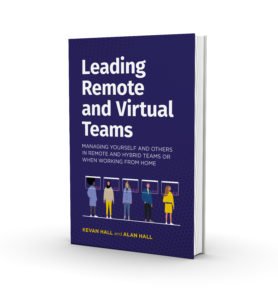Virtual Teams Effectiveness
In his article “Enhancing Effectiveness on Virtual Teams”, Gregory R Berry of the Central Connecticut State University examines why traditional skills are insufficient in creating successful virtual teams.
For Berry, the critical key difference for virtual teams is that they communicate, asynchronously (using “computer-mediated communication”) whereas face-to-face team members communicate predominantly, if not exclusively, face-to-face, which is “real time” or synchronous.
I’m not sure I’d agree with him here, because I’d rate the additional challenges of working with people from different cultures, and also that of working with people who don’t report to you and hence who are working on multiple projects, as at least equally important, if not more so.
What I did find very interesting was his assessment of the impact on team leaders.
In some areas it seems, it is all about raising your game. Berry identifies various skills and competencies which, whilst being important for traditional (face-to-face) team-working, become critical when working virtually. These include:
- Facilitating the team development process
- Defining accountabilities
- Allocating resources
- Providing feedback and support,
- Modelling desired behaviours
Clearly you can no longer get away with being average in these areas, but need to be outstanding at them.
But not only that! Virtual team leaders need additional skills not found in the traditional face-to-face teams. One example of this is that of “capturing mind share”. Leaders of virtual teams must create a sense of importance and significance for their virtual work so that if gets the priority desired. By doing this, the leader overcomes the “out of sight out of mind” problem which tends to place a lower priority on remote work.
I would also add one item to his list: they also need to be masters of communication through technology. And this means firstly understanding the range of communication technologies available, secondly knowing which ones to use, and thirdly, knowing how to get the best out of each technology.
Source: “Enhancing Effectiveness on Virtual Teams. Understanding Why Traditional Team Skills Are Insufficient.” Gregory R. Berry. Journal of Business Communication, April 2011; vol. 48, 2: pp. 186-206., first published on February 23, 2011
Check out an interactive graphic of our virtual teams learning path and training module contents.
Read our book – Leading remote and virtual teams: Managing yourself and others in remote and hybrid teams or when working from home


Explore our training programs to see how we can help.
Agile & Digital Training Matrix Management Training People and purpose Training Virtual Teams TrainingEducate yourself further with a few more or our online insights:
30 years of experience learning with a range of world class clients
We work with a wide range of clients from global multinationals to recent start-ups. Our audiences span all levels, from CEOs to operational teams around the world. Our tools and programs have been developed for diverse and demanding audiences.

Tailored training or off the shelf modules for your people development needs
We are deep content experts in remote, virtual and hybrid working, matrix management and agile & digital leadership. We are highly flexible in how we deliver our content and ideas. We can tailor content closely to your specific needs or deliver off the shelf bite sized modules based on our existing IP and 30 years of training experience.
For more about how we deliver our keynotes, workshops, live web seminars and online learning.